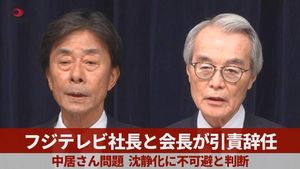President Donald Trump has recently imposed significant sanctions on Colombia, including 25% tariffs on all goods imported from the country. This drastic measure follows Colombia’s refusal to accept U.S. military transport planes carrying deported migrants.
On January 26, 2024, Trump took to his social media platform, Truth Social, to announce the sanctions, stating, "I ordered my administration to immediately take the following urgent and decisive retaliatory measures: emergency 25% tariffs on all goods coming from Colombia." This was framed as a response to actions taken by the Colombian government, which denied landing rights to two American military aircraft transporting around 160 deported migrants.
Colombian President Gustavo Petro has publicly criticized the handling of migrants, asserting on social media, "The U.S. cannot treat Colombian migrants as criminals." He emphasized the need for humane treatment and called for the establishment of proper protocols for the deportation process. His administration's refusal to allow the military planes to land was grounded not just in diplomatic courtesy but also humanitarian concerns, reflecting the sentiments of many who argue against treating deported individuals as mere cargo.
Trump's sanctions do not stop at tariffs. He has implemented travel bans on Colombian officials and has planned additional customs checks on all Colombian nationals attempting to enter the U.S. During his announcement, he warned of potentially increasing tariffs to 50% if Colombia does not comply with his demands.
This decision is set against the backdrop of broader tensions with Colombia. Just days before Trump’s announcement, Colombia had revealed it would no longer accept American flights carrying deported citizens, reflecting similar measures taken by Mexico, which also declined to accept flights from the U.S. due to concerns over the treatment of migrants.
Colombia, currently hosting approximately 15,000 undocumented U.S. citizens, is promoting the idea of welcoming migrants back home through civil aviation rather than military transport, which many argue is undignified. "I do not allow access for American planes with Colombian migrants on our territory," Petro stated, asserting the necessity for dignity and respect for deported individuals.
Trump’s administration has framed the refusal of Colombian authorities to accept these flights as a threat to national security, arguing it undermines the established legal obligations concerning the treatment and repatriation of deported migrants. "These sanctions are just the beginning," Trump vowed, indicating the potential for escalated financial and banking penalties against Colombia.
Petro’s administration has reacted by highlighting the importance of constructive dialogue rather than punitive measures. They call on the U.S. government to devise programs ensuring the respectful treatment of those being deported, promoting mutual cooperation rather than tensions.
The current diplomatic spat raises significant questions about the future relationship between the U.S. and Colombia. Experts on international relations warn this could lead to long-term ramifications not only for trade but also for security cooperation, particularly as both nations have historically collaborated on issues related to drug trafficking and immigration.
While the immediate impact of Trump’s sanctions is palpable, the underlying issues remain more complex, with the humanitarian crisis of migration requiring nuanced solutions. With both leaders firmly standing their ground, it remains to be seen how this geopolitical strain will evolve and whether paths toward resolution can be forged. Trump's aggressive approach contrasts sharply with Petro's push for dignity, raising the stakes for both nations.
Trump's sanctions, aimed at correcting what he views as Colombia's breach of legal obligations, have ignited discussions about the balance between national security and humanitarian obligations. The outcome of this standoff could redefine not only U.S.-Colombia relations but also set precedents for how similar situations may be handled globally.
Both presidents offer starkly different visions for handling migration and diplomatic relations: one rooted in strict sanctions and immediate repercussions and the other promoting dignity and respect for all individuals involved. The world watches and waits to see which vision will prevail.



